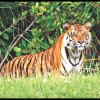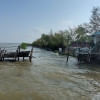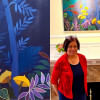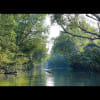The Munda people of the Sundarbans

The Munda are an ethnic community of the Sundarbans mangrove ecological zone. Originating in India, the Munda people travelled to Bangladesh around 300 years ago and have been here ever since.
They are found in Khulna, Jessore and mainly near the Sundarbans in the Shyamnagar upazila, as well as Joypurhat. They live surrounding the Sundarbans mangrove forest and depend on the ecology for their subsistence and livelihoods.
Known for their great work in agriculture in the local fields, the unique Munda community has their own distinctive language, culture and customs. Their ethnic roots distinguish them from other groups. But, due to heavy integration with surrounding communities, they have almost lost the thread of their own heritage and are on the verge of becoming the forgotten people.

The culture of the Munda people is a blend of Sarnaism and Christian cultures. Whilst they still retain the pre-Christian Mundari culture, many Christian influences have been absorbed over the years. The Mundas practice indigenous religion. They believe in a number of gods including Shiv but also believe in a different origin story.

The way they call God is through Sing Bonga, which translated means Sun-spirit. The moon and the stars are considered living witnesses of their rituals and special devotion is given to the Karam tree that saved and hid their ancestors when they were fleeing from the enemy.
The community is divided into several clans with each clan following the footsteps of their respective ancestors. The Tuti clan believes that they originate from the Sundari tree whilst the Baghor clan believes that the Tiger is their ancestor.

The clan symbol (totem) is sacred to the clan members and is present in every house hold and used in festivals and special events. The Mundas also believe in ghosts (bhoot) and spirits – both good and bad – and call on them to either help someone who is sick or to do damage to another person.
The Munda people are excellent in basket work and weaving. They also catch fish, collect wood, honey and even catch shrimp from the Sundarbans.
Local businessmen sometimes use the Munda people as labour in collection of natural resources from the Sundarbans. During festivals, the Mundas serve rice wine or haria. They are known to consume snakes, frogs, snails and even rats which they barbeque.

The Mundas speak Naguri – a dialect of the Mundari language - which is a mixture of Bengali, Hindi and Persian. Their dance is famously called Nupur and both the men and women wear anklets to perform this rhythmic dance. A dance which is very rustic in movement also features songs with lyrics that relate to everyday rituals like farming, weddings or the birth of a child.

Because of their fading heritage and culture, Relief International's-UK (RI-UK) EU funded project called "Promotion of Local Culture in the Sundarbans Impact Zone in Bangladesh through Cultural Eco-tourism and Entrepreneurship" started working with the community that was living under the Kalinchithana of Shyamnagar. Through the project, cottages have been built and the local community members have been trained as eco-guides, in hospitality and services, in finance and in security while their performances have been streamlined to include diversity.

The sites - including the Karamura Mangrove village – pays homage to the uniqueness of the dying community and hopes to help them regain their identity through community eco-tourism initiatives, promoting the local culture and biodiversity of the Sundarbans.
Members of the Munda community have participated in the capacity building workshops – a training designed to enable them to promote ecotourism sites and to promote their cultural heritage. RI UK has also provided technical support to the Munda communities to help them revive and promote their culture. Under the project, several cultural groups from the Munda communities have received financial support to purchase musical instruments, costumes and materials required for cultural performance.

The Munda community has been a part of the Sundarbans for generations now. They are a community that lives on their own wonderful traditions and customs and it is up to us to join the fight and help revive their culture and safeguard it from extinction.
By Naveed Naushad
Photo courtesy: Relief International UK/Khan Zahidul Islam

 For all latest news, follow The Daily Star's Google News channel.
For all latest news, follow The Daily Star's Google News channel. 








Comments